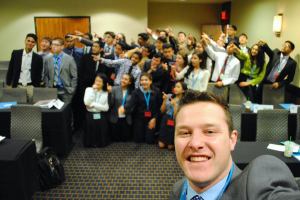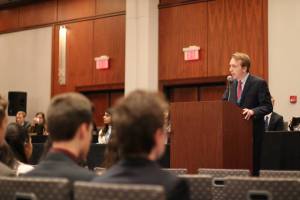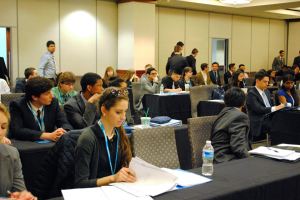This past weekend, nearly four hundred high school students convened in downtown New Brunswick, New Jersey for Rutgers Model Congress 2015. The theme of the conference was “The Future of the United States,” which called upon each and every student at the conference to consider what issues were most important to his or her future. This was presented immediately during opening ceremonies, when students were given the opportunity to take the microphone in front of the crowd and announce what the Future of American meant to them. One student mentioned equality in access to healthcare, one talked about the need for more women to learn coding and break into the technical field, while another discussed the importance of creating an inclusive atmosphere in a country that is becoming increasingly diverse day by day.
The students broke into the eighteen different committees that they would spend the weekend with in a combined eighteen hours of substantive discussion, debate and writing. These included six House, six Senate, and six Advanced committees. The topics throughout these committees varied greatly, but all focused on different aspects directly affecting the future of the nation. The House Committee on Ways and Means tackled the behemoth of Government Assistance Programs, while the House Committee on Armed Services debated extrajudicial killings and extraordinary rendition. Meanwhile, the Senate Committee on Foreign Relations worked to rebalance the Asia-Pacific strategy while the Senate Committee on Health, Education, Labor and Pensions attempted to tackle the medical questions surrounding the scarce allocation of medical resources. Other topics discussed by the House and Senate Committees included financial services reform, coastal and aquatic ecosystems, energy infrastructure, immigration detention reform, scientific policymaking, the changing landscape of the American workforce, intelligence services, the startup movement, and many others.
The Advanced Committees at RMC were some of the most challenging and unique to date. The Pharmaceutical Roundtable placed students in the roles of pharmaceutical companies, insurance companies, and even the Food and Drug Administration while facing health crises and international scandals rocking the industry. The Metropolitan Resilience Committee placed students directly in local government, acting as heads of cities and boroughs in the tri-state area working on disaster preparedness and improving infrastructure. The Sustainable Development Roundtable had students facing the realities of climate change – one of the most important and contemporary issues in the world today. The Supreme Court of the United States tackled issues of whistleblowing and free speech in MacLean v. DHS and Elonis v. U.S.
The Cabinet of the United States featured an intense, fast-paced simulation in which the various heads of cabinets and executive agencies convened to address a list of key presidential agenda items – such as foreign relations, the economy, domestic security, and more. Finally, the conferenced features the Historic George W. Bush Cabinet in 2001, on eve of the War on Terror. This committee gave students an in-depth historical perspective and allowed them to explore the situations and decisions that have continued to profoundly affect the United States and its future today.
One of the more innovative aspects of this year’s RMC was the push for collaboration among different committees. The Cabinet of the U.S. often had different cabinet members visiting House and Senate Committees to discuss various policy issues. Many committees passed bills to other committees with more appropriate jurisdiction for review, often accompanied by their sponsors to present their bills to these committees. This type of cross-committee debate and collaboration was greatly enjoyed by the students as it served to tie the conference together to an extent never before seen.
Each year, RMC has a unique series of six 1-hour-long educational workshops between committee sessions on Friday. This year, some of the highlights included a journey into Entrepreneurship by Mukesh Patel, a Rutgers alum, entrepreneur and startup advisor and an overview of Modern Political Campaigning by Alex Lewis and Adam Steinberger of M Public Affairs. Both events, and the four other staff-led workshops, were a glimpse into the kind of discourse and topics seldom covered in the traditional high school curriculum—this is yet another way RMC sets itself apart.
Rutgers Model Congress prides itself in providing an unparalleled educational experience for its students. The directors at RMC are each selected a full year in advanced and trained extensively during that time. They are also tasked with writing two 20- to 25-page policy briefs to help students prepare for the conference. The full staff, consisting of sixty Rutgers students, convenes every week and is taught to become much more than moderators in committee. Directors and Assistant Directors are encouraged to keep a close eye on debate and always ensure that the topics, many of which can often be highly complex, are fully clear and understood by every student in the room. Each time a bill is written up, they are told to sit down with the sponsors and go through each clause thoroughly, checking the bill’s overall quality. The Conference Simulation Services team enter every committee room and represent the interests of groups not represented in the committee’s existing body—from large lobbyists to foreign entities—in order to liven up debate and force students to consider issues from new angles. The Conference Logistics and Administration team works tirelessly to ensure all physical and digital materials get to the appropriate committees in a timely fashion, as well as managing the conference’s presence and conversations on social media.

Taylor Smith, Director of the House Committee on Science, Space, and Technology posing with Congressmen and Congresswomen
Conference Logistics and Administration is also responsible for the conference-wide activity that emphasizes the theme of the conference. Generally, this activity happens on the final day of the conference, but a key innovation at RMC 2015 was to spread out the conference-wide activity across all of the days of the conference in order to further the goals of the theme and to make the transition to the larger group activity on Sunday less jarring. Though it was the first time anything like this has been attempted, we received a great deal of positive feedback and will consider making this our standard way of operating going forward.
During closing ceremonies, students were reminded that the ultimate takeaways from the conference are the skills such as public speaking, writing, debating, and working with others that each student was able to powerfully develop, and which will prove invaluable in their lives moving forward. The point of the theme was that although we all may not become elected officials, we all have the opportunity to become leaders, and we will all soon become an important component of the Future of the United States. The conference proved to be a tremendous success in its goal of empowering students, as each one was provided with the incredible opportunity to explore an issue that important to them personally and to the Future of the United States. The conference concluded with the sentiment that if the students who attended RMC continued to pursue seek such opportunities and educational pursuits, then the Future of the United States is in good hands.
Please follow Rutgers Model Congress online! You can find us on:
Facebook , Instagram, Twitter and Snapchat – username: RUModelCongress!
Article submitted by Shane O’Hanlon and Indraneel Purohit, Pictures taken by Indraneel Purohit and Amy Wang




